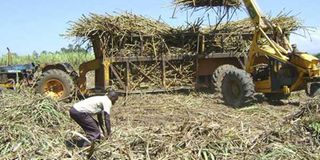Gloves off as sugar regulator vows bitter war against cartels

A farmer harvesting sugarcane in Mabanga village, Bungoma County. The sugar directorate has put on boxing gloves vowing to kick out cartels distorting the supply chain, and who have been blamed for the recent surge in retail prices. FILE PHOTO | JARED NYATAYA | NATION MEDIA GROUP
The sugar directorate has put on boxing gloves vowing to kick out cartels distorting the supply chain, and who have been blamed for the recent surge in retail prices.
The directorate says a web of tightly-knit middlemen who have exclusive rights to buy sugar for distribution, are controlling the price at retail outlets.
The move follows the recent increase in consumer prices of sugar with a kilogramme retailing at an average of Sh135 from Sh120 two months ago.
The Sugar directorate has now ordered factories to sell the commodity directly to farmers, youth and women groups, reversing the long-standing tradition where millers have only been dealing with a handful of distributors.
Tough conditions put in place by sugar millers have made it hard for many business people to venture into the lucrative trade that mainly comprises barons keen on controlling the shelf price of the essential commodity.
For one to become a distributor, a factory requires a capital of over Sh10 million and he/she should have a warehouse to store the commodity.
“As a solution to the distributor problem and the lack of regulations to check hoarding and inflating prices, I have directed millers to open up their distribution channels,” said Mr Alfred Busolo, director general of Food and Agriculture Authority (AFA).
“We should now see youth and women groups being allowed to trade in branded sugar in all areas of the country. Farmers as well shall be allocated sugar on check-off at the prevailing factory prices.”
To avoid handling cash, Mr Busolo said factories would be encouraged to use mobile channels.
At the moment, sugar directory has no regulations in place to control activities of distributors, who at times end up hoarding the commodity to create an artificial shortage and hence push up prices.
The authority has written to millers instructing them to furnish the directorate with their details in order to shed light on their activities.
Mr Busolo has also urged millers to open depots in towns closer to the locals.
“Ideally if Kenya National Trading Corporation (KNTC) was active we should have checked the power of the distributors who fix prices arbitrarily,” he said.
Before liberalisation of the sub-sector in early 1990s, all sugar manufactured in the country was sold to KNTC, which was responsible for distribution throughout the country.
Kenya Sugar Board
But with the advent of a free market, factories can now sell sugar through appointed distributors and wholesalers.
This is not the first time that the authorities have attempted to eliminate distributors from the sugar supply chain.
The now defunct Kenya Sugar Board (KSB) had planned in 2014 to get rid of the distributors from the supply chain.
“The only way to make the consumer prices realistic is by eliminating middlemen and allowing the chain stores and wholesalers to acquire the commodity directly from the factories,” said KSB then.
In 2013, the government moved to root out cartels with a directive that millers suspend all exclusive contracts with distributors, but this only lasted for a while.
The State noted that the move would encourage direct sale of sugar to any buyer and/or retailer and get rid of market distortions that contribute to the unjustified pricing.
Between 1998 and 2001, Kenya experienced what was perceived to be the biggest crisis to hit the sub-sector. This was characterised by the near-collapse of the industry as most sugar mills suffered serious financial crises. The cause was often attributed to managerial inefficiency and unregulated importation of sugar as a result of liberalisation.
Some of the retail outlets have also come under fire with the regulator accusing the retail chain of creating an artificial shortage in the market in order to unjustifiably increase prices.
The directorate says the distributors have been hoarding and rationing sugar to create an artificial shortage. This has led to the prices shooting up as high as Sh145 at a supermarket. Others are selling at Sh135.
The Competition Authority of Kenya (CAK) has moved in quickly to conduct investigations on the allegations levelled against the retailer.
The move follows the regulator’s request to the competition watchdog to investigate the outlet over anti-competitive behaviour.
Sugar regulator imported more than 15,000 tonnes of the commodity last week to tame the rising cost even as retailers complain of an acute shortage in the market.
“There is a serious sugar supply crisis in the market. We are trying our best to source as we also maintain low prices,” said Naivas Chief Commercial Officer Willy Kimani.




